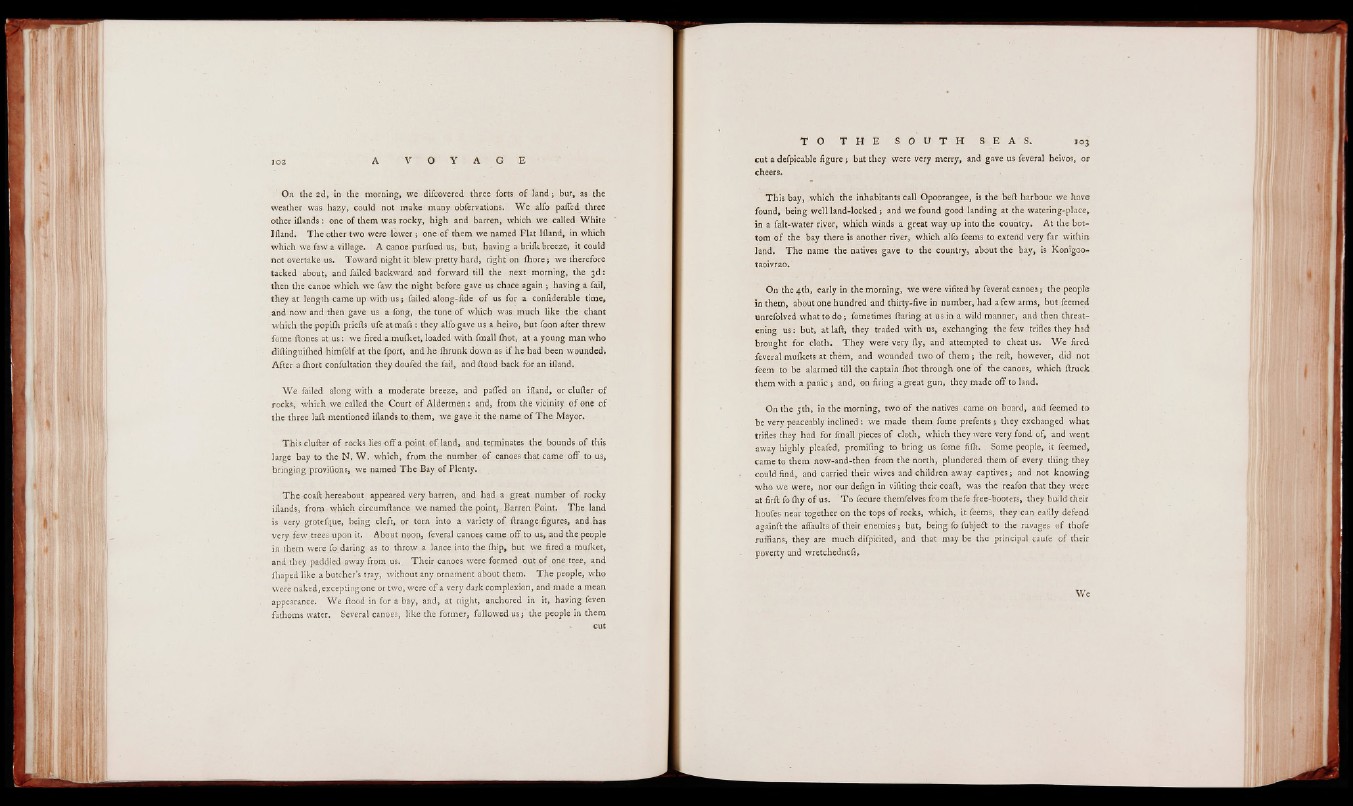
On the 2d, in the morning, we difcovered three forts of land; but, as the
weather was hazy, could not make many obfervations. We alfo patted _ three
other iilands: one of them was rocky, high and barren, which we called White
Jfland. The other two were lower j one of them we named Flat Iiland, in which
which we faw a village. A canoe purfued us, but, having a briik breeze, it could
not overtake us. Toward night it blew pretty hard, right on fhore; we therefore
tacked about, and failed backward and forward till the next morning, the 3d:
then the canoe which we faw the night before gave us chace again j having a fail,
they at length came up with us j failed along-fide of us for a confiderable time,
.and now and then gave us a ibng, the tune of which was much like the chant
which the popiih priefls ufe atmafs: they alfo gave us a heivo* but foon after threw
fome (tones at.us: we fired a muiket, loaded with fmall fhot, at a young man who
diflinguifhed himfelf at the fporfc and he fhr.unk down as if he.had been wounded,
After a ihort confultation they doufed the fail, and flood back for an iiland.
We failed along with a moderate breeze, and pafled an iiland, or cluiler of
rocks, which we called the Court of Aldermen: and, from the vicinity of one of
the three lail mentioned iflands to them, we gave it the name of The Mayor.
This cluiler of rocks lies off a point of land, and terminates the' bounds of this
large bay to the N. W. which, from the number of canoes that came off to us,
bringing provifionSj we named The Bay of Plenty.
The coafl hereabout appeared very barren, and had a great number of rocky
iilands, from which circumilance we named the point, Barren Point. The land
is very grotefque, being cleft, or torn into a variety of -flrange figures, and has
very few. trees upon it. About noon, feveral canoes came off, to. us, and the people
in them were fo daring as to throw a lance into the fhip, but we fired a muiket,
and they paddled away from us. Their canoes were formed out of one tree, and
ihaped like, a butcher’s tray, without any ornament about them. The people, who
were naked, excepting one or two, were of a very dark complexion, and made a mean
appearance. We flood in for a bay, and, at night, anchored in it, having feven
fathoms water. Several canoes, like the former, followed us 5 the people in them
cut
cut a defpicable figure j but they were very merry, and gave us feveral heivos, or
cheers.
This bay, which the inhabitants call Opoorangee, is the beil harbour we have
found, being well land-locked j and we found good landing at the watering-place,
in a falt-water river, which winds a great way up into the country. At the bottom
of the bay there is another river, which alfo feems to extend very far within
land. The name the natives gave to the country, about the bay, is Konigoo-
taoivrao.
On the 4th, early in the morning, we were vifited by feveral canoes j the people
in them, about one hundred and thirty-five in number, had a few arms, but feemed
unrefolved what todoj fometimes flaring at us in a wild manner, and then threatening
us: but, at lail, they traded with us, exchanging the few trifles they had
brought for cloth. They were very fly, and attempted to cheat us. We fired
feveral mufkets at them, and wounded two of them j the reft, however, did not
feem to be alarmed till the captain fhot through one of the canoes, which flruck
them with a panic ; and, on firing a great gun, they made off to land.
On the 5th, in the morning, two of the natives came on board, and feemed to
be very peaceably inclined: we made them fome prefents > they exchanged what
trifles they had for fmall pieces of cloth, which they were very fond of, and went
away highly pleafed, promifing to bring us fome fifh. Some people, it feemed,
came to them now-and-then from the north, plundered them of every thing, they
could find, and carried their wives and children away captives; and not knowing
who we were, nor our defign in viiiting their coafl, was the reafon that they were
at firfl fo fhy of us. To fecure themfelves from thefe free-booters, they build their
houfes near together on the tops of rocks, which, it feems, they can eaiiJy defend
againflthe aflaults of their enemies j but, being fo fubjedt to the ravages of thofe
ruffians, they are much difpirited, and that may be the principal caufe of their
poverty and wretchednefs*
We